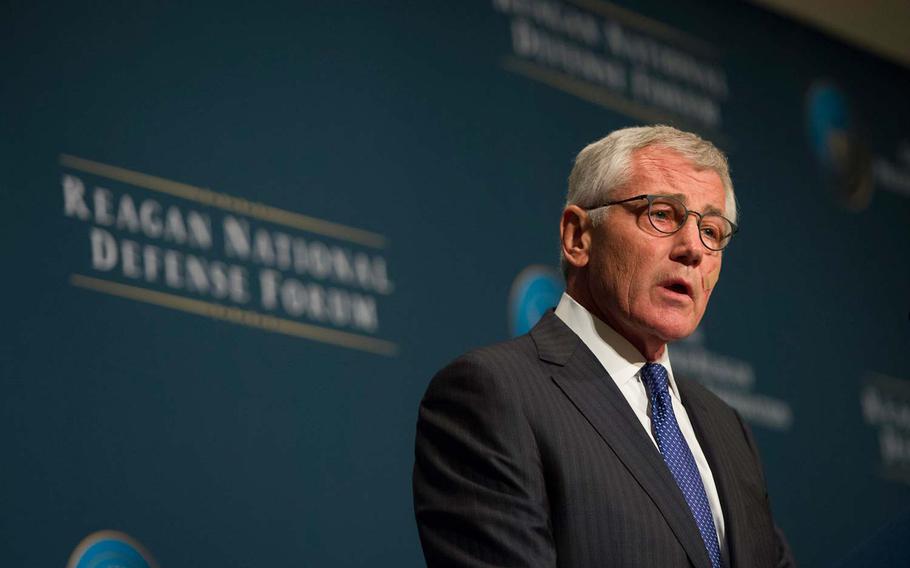
Defense Secretary Chuck Hagel delivers remarks during the Reagan National Defense Forum at The Ronald Reagan Presidential Library in Simi Valley, Calif., on Saturday, Nov. 15, 2014, amid a 5-day trip across the United States. (Sean Hurt/U.S. Navy)
This story has been updated.
FORT IRWIN, Calif. — Faced with criticism the war against the Islamic State is moving too slowly, the U.S. is speeding up efforts to train and advise Iraqi troops, sending special operations units into volatile Anbar province to begin ramping up Iraqi forces in the country’s most volatile region.
The White House announced Nov. 7 that it would send another 1,500 troops to Iraq, with more than half that number to train nine Iraqi government and three Kurdish peshmerga brigades. Those forces were to begin arriving at the end of this month with the training effort not due to be up and running for several months
Defense Secretary Chuck Hagel said U.S. special operators in Anbar have begun operations to lay the groundwork for a training and advisory mission. Hagel said the accelerated effort was recommended by Gen. Lloyd Austin, commander of U.S. Central Command.
“We ... have agreed with Gen. Austin’s recommendation to take some of the special operations forces that he has in Iraq [serving as advisers] and give them some early missions working with Iraqi security forces in al-Anbar province just to … accelerate the mission of preparing for training and equipping and the things that we need to do to start setting that up,” Hagel told reporters Sunday at Fort Irwin in California’s Mojave Desert.
A Defense official, speaking on condition of anonymity, said about 50 special operators are at al-Asad air base, which was a major hub for American forces during the 2003-2011 Iraq War.
A Pentagon spokesman on Monday detailed the mission of the troops.
“Primarily they’re the advance party to pave the way for a larger mission there in the hope-fully near future,” Col. Steve Warren told reporters. “Some of those personnel are conduct-ing the initial touches with the [Iraqi] 7th Infantry Division to begin relationship-building. Others are enablers, logisticians, communications experts—the personnel needed to begin set-ting up the infrastructure for an increased number of personnel there.”
During the war, the U.S. lost more than 1,300 servicemembers in Anbar, the country’s largest province and the bloodiest battlefield of the conflict. The Islamic State has overrun several of Anbar’s major towns and villages, including Fallujah and Hit, has threatened areas of the province near Baghdad and has slaughtered hundreds of members of a major Sunni tribe that worked closely with U.S. forces during the war.
Obama administration officials have repeatedly stressed that U.S. troops in Iraq will be engaged only in a train, advise and assist role, and will not be engaged in direct combat. That position has been roundly criticized by congressional Republicans, who have also complained about the pace of operations against the extremists.
At a town hall meeting with troops at Fort Irwin, a soldier asked Hagel if he was going to send a large U.S. invasion force to take on the Islamic State.
“This has to be an Iraqi effort,” Hagel replied. “It is their country. They have to do this themselves.”
Gen. Martin Dempsey, the nation’s top military officer, recently said the administration was “certainly considering” a limited number of American ground forces to fight alongside Iraqi troops as they launch complex missions to regain territory lost to Islamic State militants.
Hagel’s remarks about the advisers in Anbar came on the same day that the U.S. government confirmed that Peter Kassig — a former Army Ranger who served in Iraq with the 75th Rangers — had been beheaded by the Islamic State. The killing appeared on an Internet video.
Kassig, also known as Abdul-Rahman, became an aid worker and was kidnapped by the militant group while working in Syria.
In a statement, Hagel offered his condolences and praised Kassig.
“Like his fellow veterans of the 9/11 generation, his strong desire to continue making a difference in the world after serving in uniform — to continue leading a life of purpose — is an inspiration to us all. His brutal murder is one more reminder of ISIL’s ruthless barbarity,” Hagel said, using an acronym to refer to the Islamic State. “There is no starker contrast between the inhumanity of ISIL and the bright and generous spirit of the young man they murdered.”
harper.jon@stripes.com Twitter: @JHarperStripes